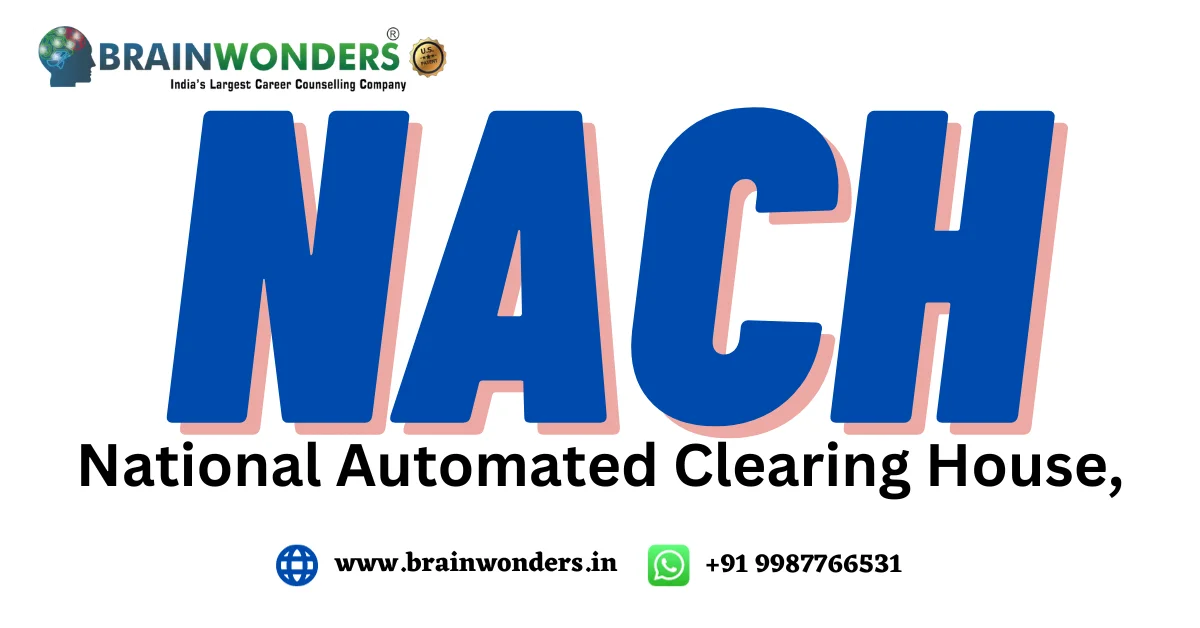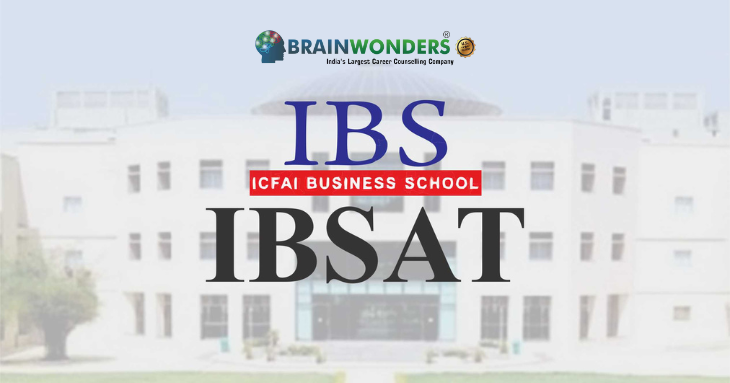

Let the best team of psychologists and career counsellors help you achieve your dream career!
Get expert guidance about your abilities, industries, and best ranked career options for you
Blog
16 February,2024 | By Brainwonders

NACH, or National Automated Clearing House, is like a digital highway for money. It lets banks and other financial places send money to each other super easy. The National Payments Corporation of India (NPCI) runs this whole thing, and their goal is to make moving money between banks simple and automatic. NACH is quick, safe, and doesn't cost a lot, which is why many businesses and people like to use it when they need to send money fast.
What's Cool About NACH Let's check out the good stuff about NACH. It's a way better system that makes payments easier, safer, and more convenient for everyone customers, banks, and businesses. For Customers With NACH, you can confirm stuff with your online banking. It also takes care of regular payments automatically, so you don't have to worry about missing them. It makes sure your payments go through when they should, which saves you a lot of time.
For Banks NACH makes sure payments arrive on time, lowers the chance of theft and fraud, makes managing finances easier, keeps costs down, and speeds up payment approvals, which helps banks keep customers happy.
For Businesses NACH helps keep customers happy since it makes paying bills easy. It also saves time and makes the online process faster than doing things by hand.
There are two types of NACH you can set up for online money transfers.
NACH Debit is used for grabbing payments for things like insurance, loans, or bills. You'll see big guys like insurance companies and banks it to collect regular payments from tons of customers.
NACH Credit is how big companies send money to lots of people at once. Think about a company paying salaries or dividends to employees each month. How NACH Does Its Thing: NACH sorts transactions in bunches. When someone starts a payment through their bank, it heads to the NPCI. Then, the NPCI sorts everything out and sends the money to the right bank account.
NACH is built to deal with loads of payments all at once, so it's great for things like salaries, pensions, and loan payments.
NPCI's in Charge: The National Payments Corporation of India (NPCI) runs the show, giving banks one spot to clear electronic payments.
Fast Payments: NACH makes money transfers happen automatically and securely between banks ASAP. This speeds things up and cuts down on paperwork.
Easy Payments: It makes payments easier, letting governments, banks, and businesses pay out money and collect funds in bulk without a hitch.
Same Format Every Time: NACH payments all look the same, so things are accurate and there are fewer mistakes. Nice and Safe: NACH has security stuff to encrypt payments and lower the risk of getting scammed.
Available Everywhere: It works with almost every bank in India, even in small towns.
Set It and Forget It: NACH lets you set up recurring payments (like bills or subscriptions) with one-time permissions, so everything happens on its own.
Updates on Payments: Both the person paying and the person getting paid get automatic updates on how things are going.
Saves You Money: NACH helps you save cash by cutting down on paper and office work. You can also schedule payments to go out automatically, which is super convenient. Plus, it matches payments for you, making bookkeeping a breeze and reducing errors.
NACH has some great perks. First off, it's quick for sending money. Transfers happen fast and safely, so the money arrives in the other person's account before you know it. Plus, it's cheaper than some other ways to pay because the fees are low. And because it cuts out a lot of manual work, there's less chance of mistakes, making it a reliable way to move funds around.
To set up NACH, you can contact your bank or use your online banking.
To apply for NACH online:
1. Sign in to your online banking account. 2. Go to Services. 3. Choose e-NACH Mandates. 4. Click e-NACH registration. 5. Enter your info and submit.
NACH is mainly for businesses and people who handle lots of money transfers. Think payroll, vendor payments, utility bills, loan installments, and other routine transactions. Any bank or financial institution that's with the NPCI can use it.
NACH has solid security. It uses encryption to guard against fraud and cyberattacks. The system also uses multi-level authentication.
To set up NACH for your business, talk to your bank and fill out the forms to register. Once they approve you, you need to provide payment details to process them through NACH. Then, the bank will set up the needed mandates and start the payments.
| Feature | NACH (National Automated Clearing House) | ECS (Electronic Clearing Service) |
|---|---|---|
| Rejection Issues | Less likely to get rejected; more accurate overall. | More likely to be rejected if there’s a mistake. |
| Paperwork | Does automatic checks. | Needs actual paper forms. |
| Common Uses | Used for all sorts of things like payments, loans, and more. | Mostly used for certain payments in the past. |
NACH is a cool electronic system that has changed how businesses and people transfer funds between banks. It’s fast, secure, and cheap, so it's good for companies dealing with regular payments. NACH uses encryption and various verification methods, which keeps your money safe from fraud and online threats. Thinking about a reliable and easy way to send money? Check out NACH.
Frequently Asked Questions (FAQs)
1. How Does NACH Differ from NEFT?
Ans: NACH operates as an electronic clearing system that processes transactions in batches, while NEFT functions as a real-time fund transfer system, processing transactions individually.
2. What Is the Maximum Transaction Limit for NACH?
Ans: The maximum transaction limit through NACH varies depending on the bank and the type of account. Most banks set a limit of Rs. 5 lakh per transaction.
3. Can NACH Be Used for International Transactions?
Ans: NACH exclusively serves as a domestic fund transfer system and is not applicable for international transactions.
4. What Is the Typical Processing Time for NACH Transactions?
Ans: NACH transactions are typically processed within 2-3 working days.
5. Is NACH Acceptable for Paying Credit Card Bills?
Ans: NACH can make credit card bill payments, provided the credit card issuer accepts NACH payments.
6. What is UMRN?
Ans: The Unique Mandate Reference Number (UMRN) is allocated when a new NACH Debit mandate is established. This identifier is essential for every transaction, encompassing modifications and cancellations.
7. What types of transactions can NACH handle?
Ans: NACH is a system designed to handle large, recurring interbank transactions. It is also utilized for consolidating various types of payments, including water and telephone bills, electricity charges, loan repayments, insurance premiums, and investment contributions.
Let the best team of psychologists and career counsellors help you achieve your dream career!



,_Syllabus,_Pattern,_Old_Question_Papers.png)

